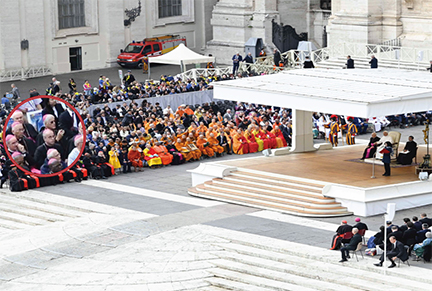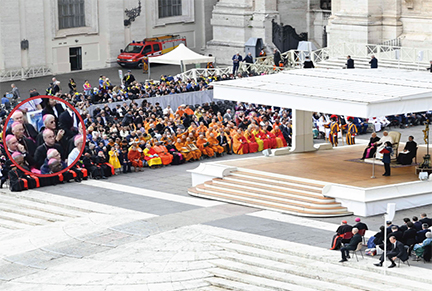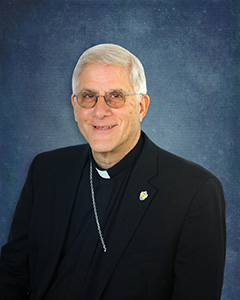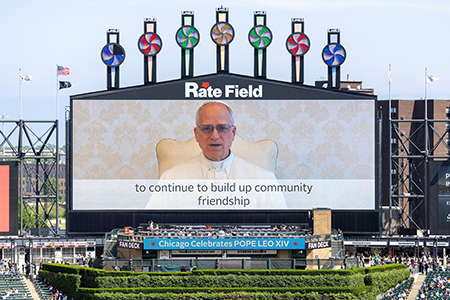By Bishop Joseph R. Kopacz, D.D.
The Wednesday papal audience regularly gathers pilgrims from around the world in St. Peter’s Square, and during this Jubilee Year the square could not contain the vast throng. The universality of the church was on full display during the nearly two-hour audience with Pope Leo XIV, which was well worth the 6 a.m. departure from our hotel.
The Holy Father’s message, delivered in eight languages, went out to all the earth with the passion of Psalm 19: “The heavens declare the glory of God; the skies proclaim the work of his hands. Day after day they pour forth speech; night after night they reveal knowledge. They have no speech, they use no words; no sound is heard from them. Yet their voice goes out into all the earth, their words to the ends of the world.”
Human speech echoed around the square to the delight of all physically present and to the virtual cloud of witnesses around the world.

Inset shows Bishop Joseph R. Kopacz of Jackson, who was among those in attendance. (CNS photo/Vatican Media)
With each audience, bishops are invited to come forward to sit near the stage, and our hearty group’s early arrival gave me an excellent vantage point to see, hear and appreciate the unpretentious yet splendid presentation surrounding Pope Leo’s message. As an added bonus, I was fortunate to sit next to the archbishop of Bangkok, Thailand, who spoke about the church’s reality in a country that is 96% Buddhist, where Catholics number around 500,000 – about 1% of the total population.
It was a relevant portrayal because, to my left, there were as many Buddhist monks at the audience as there were bishops. Pope Leo had just conducted an interfaith prayer service for peace at the Colosseum the day before with representatives from all major religious traditions.
The central focus of the pope’s words at the Colosseum and the audience was prayer and a plea for peace, justice and reconciliation, inspired by the 60th anniversary of Nostra Aetate (In Our Age), a document of the Second Vatican Council that highlighted the need for interfaith prayer, dialogue and study for God’s glory and a more just and peaceful world. The love of Jesus Christ impels us to proclaim the Gospel of salvation and peace everywhere and for all time.
At the conclusion of each audience, all bishops are welcome to form a line to personally greet the Holy Father. This procession and the entire audience are preserved on the Santa Sede Vaticano website, with the unabridged encounters of each bishop with the pope. It is a treasured moment that is stored in memory for me and preserved on social media for countless others.
What words were exchanged between us during that heartfelt greeting? I introduced myself as being from the Diocese of Jackson and the state of Mississippi, and he smiled and said, “Ah, the United States.” Pope Leo XIV is the first successor of St. Peter to know that Mississippi is more than a river. After thanking him for his ministry in the church, I departed with a pair of rosaries – a prized gift from the Holy Father.
Immediately afterward, there was a joyful reunion with our diocesan group of pilgrims, who had advantageous seating in the square, allowing them to view the stage and capture it all on the big screen nearby. Afterwards, while walking through the square in my episcopal house cassock as everyone was spilling into the neighboring streets and passageways, there were many interactions and conversations.
I spoke to, prayed over, and took photos with pilgrims from France, Mexico, Ireland, Peru, the Philippines and Indiana. What a delight! This is where it came full circle with my recent travels. I asked the pilgrims from Mexico where exactly they live, and the first place blurted out was Saltillo. How true it is that all roads lead to Rome.
The mission trip to Saltillo was an exceptional springboard into pilgrimage and will be the subject of another column. One of the pilgrims from Peru stated the old adage in another way: “Obispo, es un mundo pequeño.” (“Bishop, it’s a small world.”)
Verdad, peregrino, verdad! True, pilgrim, so true. The message of the Good News of Jesus Christ, crucified and risen from the dead, goes out to the ends of the earth and back again. The Wednesday audience left no doubt about this truth.





